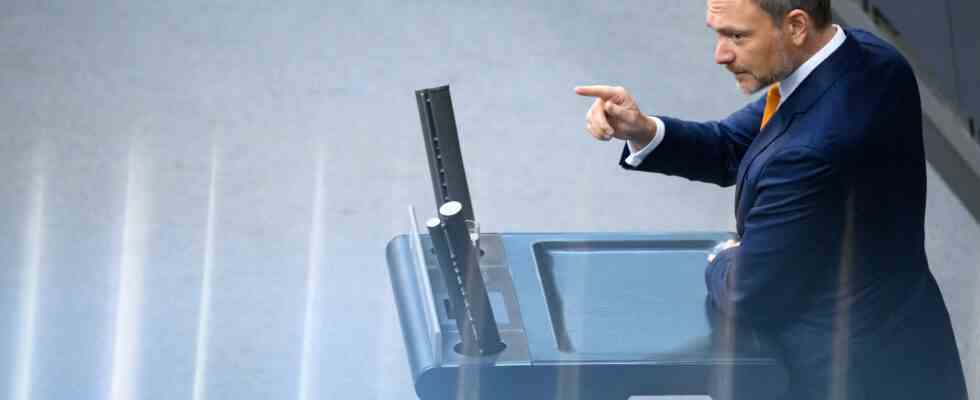comment
Status: 11/25/2022 1:37 p.m
The Bundestag has approved the 2023 budget. The Union’s criticism of the “record debt maker” Lindner is hypocritical, says Hans Joachim Vieweger. But debt will still be a problem decades from now.
In formal terms, he has done it: Christian Lindner has brought a federal budget through parliament that, for the first time in three exceptional years, once again complies with the debt brake of the Basic Law. But the FDP Finance Minister had to bend to the extreme for this. Because it wouldn’t have been possible without the debts, which he quickly got approved this year.
After all, it is about 360 billion euros that will be spent in addition to the regular budget in the coming years – the transparency of the budget is increasingly lost, as the Federal Court of Auditors rightly complains.
Hypocritical criticism from the Union
The Union parties agree with this criticism and accuse Lindner of being a “record debt maker”. But that’s hypocritical: You can’t bemoan the debts and demand new spending in the next breath – as was seen in the debate about the electricity and gas price brake. The CDU and CSU talked about a “winter gap” until the traffic light coalition gave in and announced additional relief for January and February.
Relief may sound good from the point of view of citizens and business. But the state has no money of its own – it can only distribute the tax money it takes from citizens and companies. Ultimately, this also applies to debt financing – we’ll just pay more for that in the future. together with the interest due.
The cautious turnaround in interest rates by the European Central Bank is already having an effect: if the interest burden was four billion euros last year, forty billion euros are planned for this in the federal budget for the coming year.
“Double boom” will still cost in 2060
Today’s debts are increasingly restricting tomorrow’s room for maneuver – whereby it is noticeable that the traffic light coalition has pushed back the repayment of the loans from the so-called special funds for the time being – with the result that our children will still be in the year 2060 Today’s “double booms” have to be financed. Is that fair?
It may sound quite reasonable when politicians say: In order to invest in the future, you have to take on debt – be it for investments in a proper infrastructure, digitization or climate protection.
The experiences of the past few months and also of the budget week show that in the end politicians mainly incur debts in order to distribute benevolence. This, however, promotes an attitude of entitlement that is not sustainable. And everyone who calls for the state in a crisis should know that.
Editorial note
Comments always reflect the opinion of the respective author and not that of the editors.

